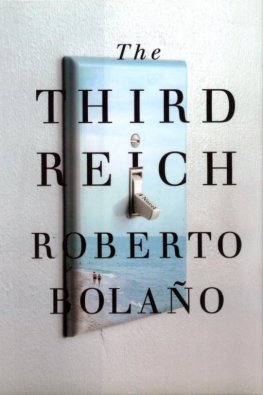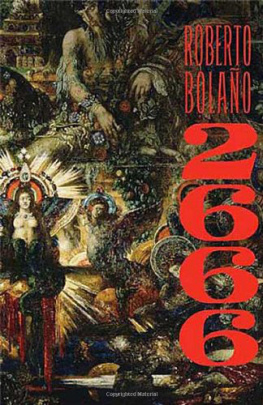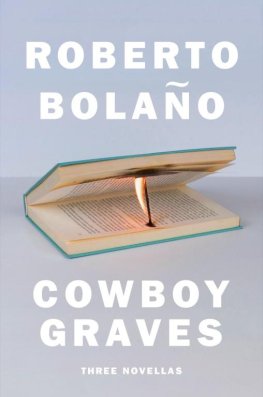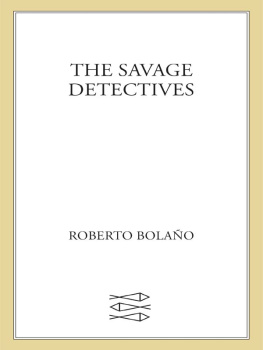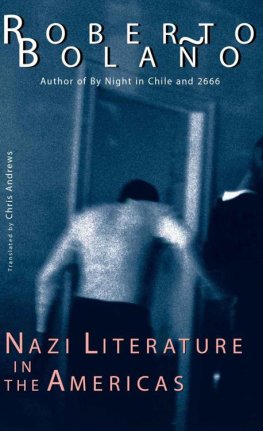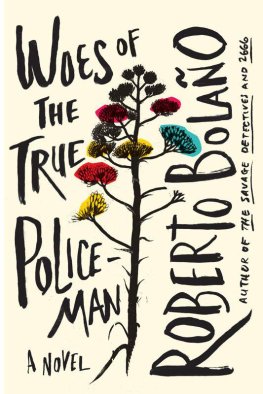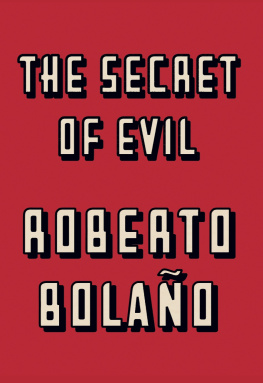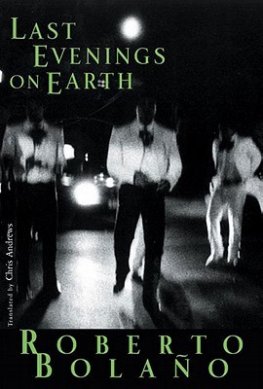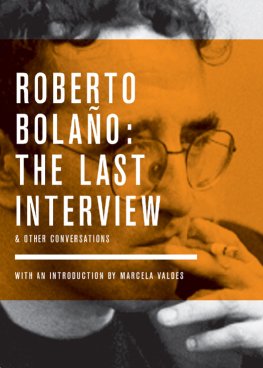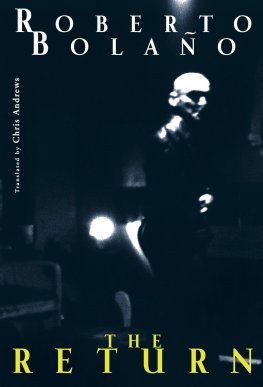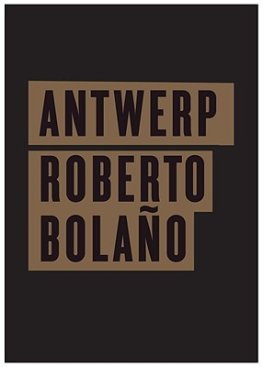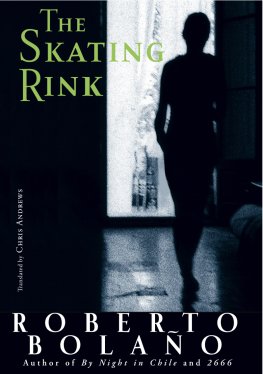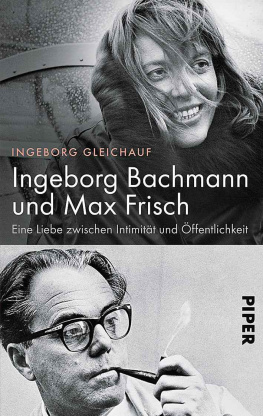Roberto Bolao
THE THIRD REICH
Translated from the Spanish by Natasha Wimmer
Sometimes we played with traveling salesmen, other times with vacationers, and two months ago we were even able to condemn a German general to twenty years of imprisonment. He happened by with his wife, and only my wiles saved him from the gallows.
Friedrich Drrenmatt,
TrapsThrough the window comes the murmur of the sea mingled with the laughter of the nights last revelers, a sound that might be the waiters clearing the tables on the terrace, an occasional car driving slowly along the Paseo Martimo, and a low and unidentifiable hum from the other rooms in the hotel. Ingeborg is asleep, her face placid as an angels. On the night table stands an untouched glass of milk that by now must be warm, and next to her pillow, half hidden under the sheet, a Florian Linden detective novel of which she read only a few pages before falling asleep. The heat and exhaustion have had the opposite effect on me: Im wide-awake. I usually sleep well, seven or eight hours a night, though I hardly ever go to bed tired. In the mornings I wake up ready to go and I can keep going for eight or ten hours straight. As far as I know, its always been like that; its how I was made. No one taught me to be this way, its just how I am, and by that I dont mean to suggest that Im better or worse than anybody else, than Ingeborg herself, for example, who on Saturdays and Sundays doesnt get up until after noon and who during the week needs two cups of coffeeand a cigarettebefore she manages to really wake up and get offto work. Tonight, though, Im too hot and tired to sleep. Also, the urge to write, to set down the events of the day, keeps me from getting into bed and turning out the light.
The trip came off without any mishaps worth mentioning. We stopped in Strasbourg, a pretty town, though Id been there before. We ate at a kind of roadside market. At the border, despite what wed been told to expect, we didnt have to stand in line or wait more than ten minutes to cross over. Everything was quick and efficient. After that I drove because Ingeborg doesnt trust the drivers here, I think because she had a bad experience on a Spanish highway years ago when she was a girl on vacation with her parents. Also, she was tired, as is only natural.
At the hotel reception desk we were helped by a very young girl who spoke decent German, and there was no problem finding our reservations. Everything was in order, and as we were on our way up I spotted Frau Else in the dining room; I recognized her right away. She was setting a table as she made some remark to a waiter who stood next to her holding a tray full of salt shakers. She was wearing a green suit, and pinned on her chest was a metal brooch with the hotel logo.
The years had scarcely touched her.
The sight of Frau Else brought back my adolescence, its dark and bright moments: my parents and my brother at breakfast on the hotel terrace, the music that at seven in the evening began to drift across the main floor from the restaurant speakers, the idle laughter of the waiters, and the plans made by the kids my age to go night swimming or out to the clubs. What was my favorite song back then? Each summer there was a new one, resembling in some way the songs from previous summers, hummed and whistled constantly and played at the end of the night by all the clubs in town. My brother, who has always been particular when it comes to music, would carefully choose what tapes to bring along on vacation; I preferred to pick up some new tune at random, inevitably the song of the summer. I had only to hear it two or three times, purely by chance, in order for its notes to follow me through sunny days and the new friendships that enlivened our vacations. Fleeting friendships, when I look back today, existing only to banish the faintest hint of boredom. Of all those faces only a few linger in memory. First, that of Frau Else, who won me over from the start, which made me the butt of jokes and teasing by my parents, who even made fun of me in front of Frau Else and her husband, a Spaniard whose name I cant recall, with references to my supposed jealousy and the precocity of youth that made me blush to the roots of my hair and that inspired in Frau Else an affectionate sense of camaraderie. After that I thought she showed a special warmth in her treatment of me. Also, although it is a very different case, there was Jos (was that his name?), a boy my age who worked at the hotel and who took us, my brother and me, to places where wed never have gone without him. When we said good-bye for the last time, possibly guessing that we wouldnt spend the next summer at the Del Mar, my brother gave him a couple of rock tapes and I gave him an old pair of jeans. Ten years have gone by and I still remember the tears that filled Joss eyes as he clutched the folded jeans in one hand and the tapes in the other, not knowing what to do or say, murmuring (in an English that my brother was always making fun of): Good-bye, dear friends, good-bye, dear friends, etc., while we told him in Spanisha language that we spoke with some fluency; not for nothing had our parents vacationed in Spain for yearsnot to worry, the next summer wed be like the Three Musketeers again, and that he should stop crying. We got two postcards from Jos. I answered the first one in my name and my brothers. Then we forgot about Jos and never heard from him again. There was also a boy from Heilbronn called Erich, the best swimmer of the season, and Charlotte, who liked to lie on the beach with me although it was my brother who was crazy about her. Then there was poor Aunt Giselle, my mothers youngest sister, who came with us on the second-to-last summer we spent at the Del Mar. More than anything else, Aunt Giselle loved bullfighting, and she couldnt get enough of the fights. Indelible memory: my brother driving my fathers car with complete impunity and me sitting next to him, smoking, without a word from anyone, and Aunt Giselle in the backseat staring in ecstasy at the foamsplashed cliffs and the deep green of the sea beneath us with a smile of satisfaction on her pale lips and three posters, three treasures, on her lap, proof that she, my brother, and I had rubbed shoulders with the bullfighting greats at the Plaza de Toros in Barcelona. I know my parents disapproved of many of the activities that Aunt Giselle pursued with such passion, just as they werent pleased by the freedoms she permitted us, excessive for children, as they saw it, although by then I was nearly fourteen. At the same time, Ive always suspected that it was we who looked after Aunt Giselle, a task my mother assigned us without anyone realizing, surreptitiously and with great trepidation. In any case, Aunt Giselle was with us for only one summer, the summer before the last we spent at the Del Mar.
Thats almost all I remember. I havent forgotten the laughter at the tables on the terrace, the galleons of beer that were emptied as I looked on in astonishment, the dark, sweaty waiters crouched in a corner of the bar talking in low voices. Random images. My fathers happy smile and approving nods, a shop where we rented bicycles, the beach at nine thirty at night, still with a faint glow of sunlight. The room we had then was different from the one were in now; whether better or worse I cant say, different, on a lower floor, and bigger, big enough to fit four beds, and with a large balcony facing the sea, where my parents would settle in the afternoons after lunch to play infinite card games. Im not sure whether we had a private bathroom or not. Probably some summers we did and others we didnt. Our room now does have its own bathroom and also a nice big closet, and a huge bed, and rugs, and a marble table on the terrace, and green curtains of a fabric silky to the touch, and white wooden shutters, very modern, and direct and indirect lights, and some well-concealed speakers that play soft music at the touch of a button No doubt about it, the Del Mar has come up in the world. The competition, to judge from the quick glance I got from the car as we were driving along the Paseo Martimo, hasnt been left behind either. There are hotels that I dont remember, and apartment buildings have sprung up on once vacant lots. But this is all speculation. Tomorrow Ill try to talk to Frau Else and Ill take a walk around town.

